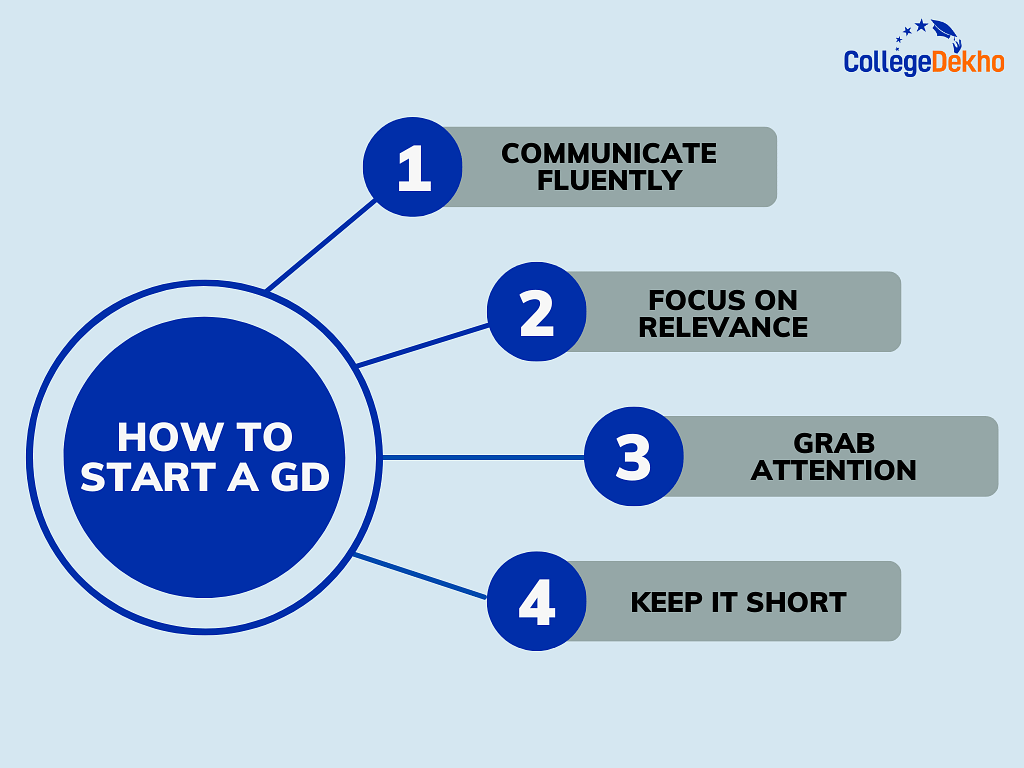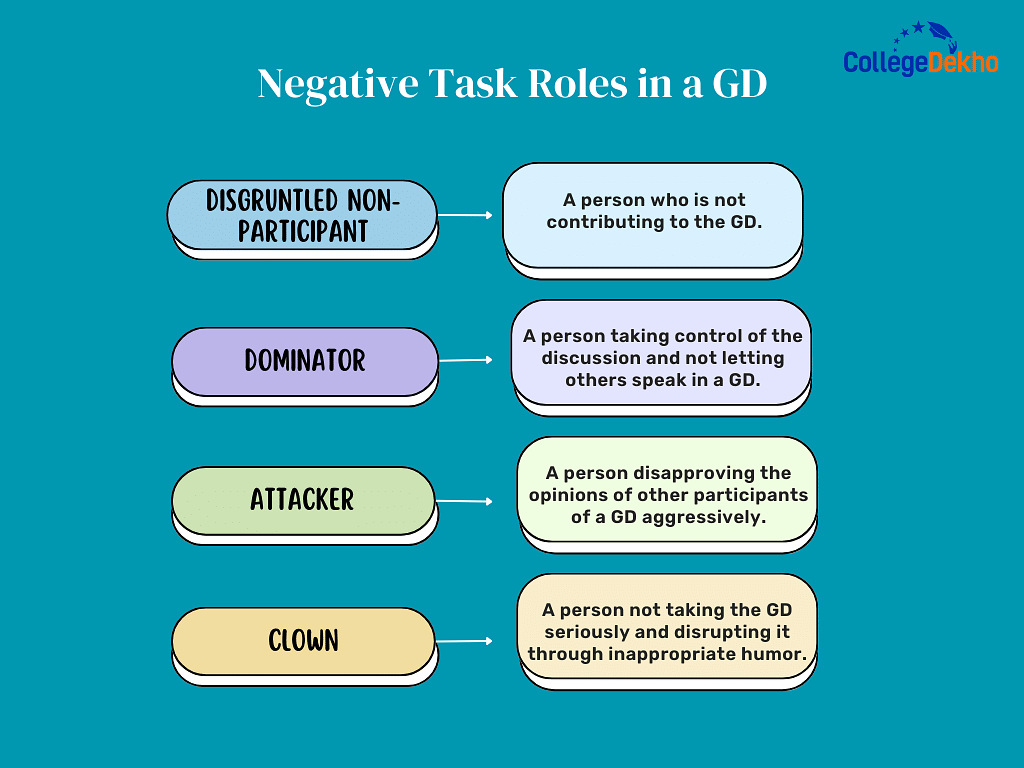Group Discussion is one of the most important parts of the admission procedure to the top MBA colleges in India. With a few simple tips, you can learn how to start, lead and conclude group discussion in order to perform well in the GD round.
- Tips to Ace a Group Discussion (GD)
- How to Start a GD
- How to Lead a GD?
- How to Disagree in a Group Discussion?
- How to Enter a GD in the Middle of the …
- How to Stay Active Throughout a GD
- How to Conclude a GD
- Topics for Group Discussion (GD)
- Positive Task Roles in a Group Discussion (GD)
- Negative Task Roles in a GD
- Faqs

How to start, lead, and conclude a group discussion (GD) is a skill that can be tough to master. During the admission process in MBA colleges, a group discussion round is conducted to analyze the awareness, preparedness, communication, analytical, logical, and leadership skills of applicants. It is very important to qualify for the GD round to qualify for Personal Interviews (PI). Group discussions play a major role in deciding whether a candidate possesses the qualities and knowledge that are required for management courses or not.
It is a great opportunity for MBA aspirants to convince panelists of their conversation skills, wit, awareness, and knowledge. Group Discussion (GD) round at all the top B-schools usually begins in the second week of February and goes on till the end of March. While most of the IIMs do not have a Group Discussion round, some of the top MBA colleges such as FMS Delhi have reintroduced the GD round in the final selection process of the top MBA colleges in India. If you have been considered for MBA admission to your desired college, then take a look at some of the best tips on how to start, lead, and conclude a group discussion.
Also Read:
Tips to Ace a Group Discussion (GD)
Students can go over the pointers given below to familiarise themselves with the tips and tricks to leave a great mark in a group discussion:
You should keep pace with modern events, global occurrences, problems concerning India and the planet, etc. so that you can express your thoughts and opinions when inquired.
To react appropriately in a group conversation, you must have perseverance and impactful listening abilities. Remember that the discussion panel is comprised of individuals from the college administration who are only there to select the best. As a result, even minor errors can cost you a lot of money.
The best way to approach every scenario is to confront it. As a candidate, you will no longer take a single entrance test and depend on it for enrollment. Every student takes at least 4 to 5 tests, such as the CAT, MAT, XAT, SNAP, CMAT, and NMAT by GMAC, among others.
If you are self-assured about your entrance exam performance, you must receive more than 2 to 3 discussion invitations from universities. I will advise students to consult Manorama Yearbooks and read them to cover general understanding and current events subjects.
You should read the editorials in The Hindu and The Indian Express, which provide a detailed look at the problems that Indian culture and politics encounter regularly.
You should tune in to debate live performances on English news networks such as Times Now and NDTV 24X7. This will give a better idea of how to proficiently interact during a GD session. Even talk shows about current events and social issues can be a good resource for observing and learning.
Work on your leadership skills, listening skills, interpersonal skills, convincing power, and presentation skills so that you can start, lead, and conclude a group discussion.
Also Read: IIM Interview
How to Start a GD
By learning how to start a group discussion, you not only get an opportunity to speak but also get to grab everybody’s attention. Beginning a GD gives you an edge over other candidates as you get maximum uninterrupted time to share your views and skills with the examiner as other participants are still busy understanding the topic. Also, while initiating a Group Discussion, you should not state the wrong facts or stammer. Take a look at some of the tips on how to start a group discussion mentioned below:

Communicate Fluently: If you are starting the GD, make sure that you present your views fluently. Try not to stammer as being confident about your point-of-view is of utmost importance.
Focus on Relevance: It should not seem that you are starting the GD just for the sake of beginning first. Your points should be relevant to the topic and must grab the attention of the participants.
Grab Attention: You can also start the GD with a shocking statement, question, quotation, definition, or facts. All these things can be used to present your take on the subject to lead the GD further.
Keep it Short: If you are indeed planning on starting the GD, make sure that you do not over-elaborate on your points. Present your views in the most precise way possible as the evaluators are not looking for a story.
It is very important to understand that leading the GD is the best way to start as it gives you the undivided attention of the participants as well as the GD regulator. Starting a GD also gives you uninterrupted time to put up your points while other participants are thinking. However, if you are starting the GD, your points have to be very relevant.
How to Lead a GD?
To lead a group discussion effectively, you need a combination of good communication skills, facilitation techniques, and the ability to manage group dynamics. Follow these tips to lead a group discussion effectively:- Understand the Topic: Before the discussion, make sure you have a clear understanding of the topic. Research relevant information to guide the conversation and answer questions.
- Encourage Active Participation: Engage all participants in the discussion. Encourage quieter members to express their opinions and manage dominant participants to ensure everyone gets a chance to speak.
- Facilitate, Don't Dominate: Your role is to facilitate the discussion, not dominate it. Avoid expressing personal opinions too strongly and focus on guiding the group.
- Reflect on the Discussion: After the discussion, take a moment to reflect on what went well and areas for improvement. Use this feedback to enhance your facilitation skills for future discussions.
How to Disagree in a Group Discussion?
When it relates to conflicting or expressing opposition, an assertion backed up by solid evidence is required. People frequently engage in discussions for the sake of engaging in them. This could result in awkwardness so you need to stay calm and peaceful while expressing your disagreements.
Importance of body language
Politeness and voice modulation
Never make it a personal
Always try to be a good and attentive listener
How to Enter a GD in the Middle of the Discussion
To enter the group discussion in the middle of the discussion, it is best to address any questions that may arise beforehand.
Listen intently – In case you are planning to start the GD, keep your ears open and observe what the other speakers are talking about. Listening not only gives you positive marks but also gives you an insight into what the other participants think about the topic and you can prepare your points accordingly. It is immensely helpful if you don’t understand the topic.
Target the low points – There are high and low points in a GD, i.e. when the discussion is at its peak (high) or when the contestants have concluded their point (low). You have to target the low points and glide into the discussion effortlessly.
Continue where the participants have left – When a participant is done putting up his or her point, you can jump into the conversation and talk about why you agree or disagree with their points and put forward your views.
Express dissent – Putting forth unpredictable points is a crucial part of the GD. If you have a different take on the subject or have something new to present, you should put it forth very clearly with reasons.
How to Stay Active Throughout a GD
You can demonstrate your communication and critical thinking abilities to university admissions teams or prospective employers through group discussions.
Bring new ideas – To maintain your place in the GD, you will have to express points about the topic that the other contestants have not mentioned. This will help you get the attention of the GD regulator and score some extra points.
Be perceptive – In case you don’t have any new ideas, you can present a different perspective on the points that the other participants have presented. Share your views about the points that have been talked about so far in a different light to present your point of view and support your argument.
Stay on track – You can also make your come-back in the discussion by bringing the discussion on track if it is deviating from the topic. This will help you to lead the discussion and nail the group discussion.
Be convincing – You can also convince the other participants to get back in the discussion. Eye contact, agreement and body language are the best tools to win the favour of other participants and lead the discussion in the direction that you want.
Also Read:6 Types of People You Will Find in a Group Discussion
How to Conclude a GD
MBA aspirants are often known to ask what's the best way to conclude a Group Discussion before their MBA selection rounds. Knowing how to conclude effectively is a crucial part of the GD round as it helps candidates gain more points. Take a look at the best ways to conclude a group discussion mentioned below:
Summarise all the points – The best way to conclude is to summarise all the points that you have discussed in brief and present your final take on the subject being discussed.
Be concise – Make sure that you don’t drag your conclusion. Keep it as short as possible and try to mention the points clearly. Don’t mention any new point in the conclusion just support what has already been spoken about.
Closure argument – Make the closure around the main idea of the topic and be direct. Don’t beat around the bush. All your points should build up the conclusion.
The most important thing to remember about the GD is to not mention any figures or data unless you are sure about its accuracy. You should not stay quiet in the GD for too long. Active participation is of utmost importance.
While making your points, try not to appear like a dominator, and allow other people to speak. Don’t attack people while speaking and maintain a calm aura through the discussion. Keep the above tips in mind and you’ll do excellent in the group discussion.
Topics for Group Discussion (GD)
Aspirants who will be appearing for Group Discussion rounds must prepare only the most common topics asked during GD. Given below is a list of the most important topics for Group Discussion:
Top Group Discussion Topics | |
|---|---|
"No One Wins in a War": A Group Discussion Perspective | Narayana Murthy's Call for a 70-Hour Workweek: A Debate on Pros and Cons |
India’s Solar Mission Aditya-L-1: Another Success Story in Space | India Middle East Europe Economic Corridor |
Global Space Economy: Can India Be a Leader? | Women Reservation Bill |
India Semiconductor Mission: Why is Chip Manufacturing a priority for Modi Government; Economic Impact | China Plus One Strategy: How India can Benefit from Global companies adopting China Plus One Strategy |
‘One Nation One Poll’: Benefits are More for India | Chandrayaan 3 – Benefits for India & Management Lessons |
India to overtake US as world's second-largest economy by 2075: Goldman Sachs Report | Uniform Civil Code: History, Benefits and Concerns, UCC Bills |
Digital Personal Data Protection Bill | ChatGPT: Dangers of plagiarism |
Work From Home: Desirable and Dream Job Option for Employees? | Cricket Vs Other Games in India: Is Cricket Killing Other Sports? |
Foreign Universities in India: Will it raise academic standards and benefit Indian students and parents? | Government to set up National Digital Library of India (NDLI) for Children and Youth: Can it replace Physical Infrastructure? |
India overtakes China as the world's most populous country: Is Population a Boon or a Bane? | World War 3: Will Russia-Ukraine Conflict result in Third World War? |
Digital Public Goods (DPG): India’s approach and opportunities for the World | Union Budget 2023-24: Expectations & Key Highlights |
Women’s Premier League (WPL): A positive for Indian Women & Sports? | Bharat Interface for Money (BHIM): Making India Cashless? |
Unemployment in India: Unemployment Rate Reaches highest level in 2023 | National Green Hydrogen Mission launched; Can India lead the world in Green Energy? |
G 20 - India Presidency in 2023: History, Plans, Expectations and Roadmap | National Logistics Policy: Will it Reduce Costs & Improve Competitiveness of India |
Air India Disinvestment by BJP Government & Acquisition by TATAs: Selling Family Silver or Saving Taxpayer’s Money | Central Bank Digital Currency (CBDC): Impact on Indian Financial System & Cryptocurrency |
Will Open Network for Digital Commerce (ONDC) disrupt E-Commerce, and become the next UPI and Aadhaar? | SUPER APP in India – Will TATA NEU work? Do customers want Integration or Decentralization |
Semiconductor Crisis - Why it is Critical, Reasons for Shortfall (China-Taiwan Conflict) & how India can safeguard? | Gujarat Govt Has made The Bhagavad Gita Part of The Syllabus. Should a Religious Text Be Taught in Government Schools? |
HDFC and HDFC Bank Merger: Big Becomes Bigger – Impact on Indian Banking & Industry? | NATO, G7, EU and other bodies are not effective in maintaining Global Peace & Order |
National Startup Day & Startup Boom in India: Are Unicorns Real or Just Paper Tigers? | NSE Scam: Misuse of authority by former CEOs Chitra Ramakrishna, Ravi Narain for NSE Co-location Fraud and many others – Are Indian Public Institutions safe? |
Positive Task Roles in a Group Discussion (GD)
Here are some positive roles that will help you get points in a group discussion. Make sure you are
Initiator – Starting a Group Discussion, giving definitions, and introducing and suggesting new ideas. This is one of reasons why learning how to start a group discussion can be helpful.
Information giver – During GD sharing facts and information.
Information seeker – In a Group Discussion, gathering and soliciting information from others.
Opinion seeker – Asking other participants of the GD for their opinion.
Procedure facilitator – Leading a GD round by keeping track of the discussion.
Clarifier – Clarifying all the opinions and ideas discussed during a GD.
Opinion giver – Giving your opinion in a Group Discussion on the statement provided by the other participant.
Tension Reliever – Discussing and Presenting the problem from a broad perspective.
Social Supporter – Giving support to ideas and suggestions of all participants of a GD.
Compromiser – Creating harmony between different opinions by giving compromising solutions.
Energizer – Encouraging other participants to explore some new ideas during a Group Discussion.
Gatekeeper – Involving other participants/ members in the GD by asking for their opinion
Summarizer – Concluding or summarising a GD by including all important points discussed during a Group Discussion round. Often panelists award extra points to the individual who concludes. Thus, aspirants must focus on what's the best way to conclude a Group Discussion during preparation.
Negative Task Roles in a GD
Following are some roles that you should avoid at all costs during a GD.

Disgruntled non-participant: Someone who does not contribute to the group discussion.
Dominator: Someone who takes control of the discussion and does not let others speak during a group discussion.
Attacker: Someone who disapproves the opinions of other participants in a group discussion aggressively.
Clown: Someone who does not take the group discussion seriously and disrupts the discussion through inappropriate humour
Candidates may also check out the articles mentioned below to know more about MBA admissions and the different stages of the selection process.
Related Articles:
Written Ability Test (WAT) for IIMs and Other Top MBA Colleges | |
|---|---|
Candidates who have any queries related to the group discussion round may ask questions on the Collegedekho QnA zone. For admission-related assistance, fill out our Common Application Form.

















Similar Articles
List of Top IIMs in India 2024: Check Rankings, Courses, Fees, Placement Details
CMAT Score vs Percentile 2024: Percentile Calculator, Cutoff
List of Colleges Accepting TS ICET 2024 Rank from 10,000 - 25,000
TS ICET MBA Cutoff 2024 - Previous Year and Expected Cutoff
List of Colleges Accepting 25,000 to 35,000 Rank in TS ICET 2024
TS ICET 2024 Rank Wise Colleges List